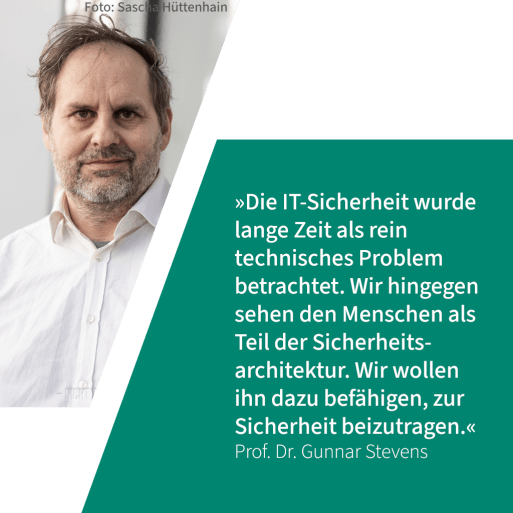Prof. Dr. Gunnar Stevens, Head of IT Security and Consumer Informatics, works with many other colleagues at the University of Siegen on the question of how to give people a sense of the dangers on the internet and how to make them media literate. Among other things, he is researching how smart speakers and other devices for the intelligent home can be made more secure.
Data protection risks with smart speakers
The problem is that people generally use such devices without giving much thought to the issue of security. "However, a smart speaker actually collects a lot of information about the user, their preferences and interests," says Gunnar Stevens. In addition, when the devices are active, they send parts of conversations or ambient noise to the provider's servers. In the checkMyVA research project, he analyzed such snippets of recordings - such as snippets of conversations recorded during a party - to find out to what extent they reveal information about certain topics or intimate and confidential content. "We don't know what happens to such information in detail," says Gunnar Stevens. "It's like a black box." In a study conducted as part of the checkMyVA project, participants reported that they had received targeted advertising for specific products a few hours after talking about certain topics.
The SAM Smart safety assistant
In the new joint project SAM-Smart , Gunnar Stevens wants to inform users about the risks in a concise and understandable way. It would be conceivable to display the relevant information on a screen, cell phone or television, for example with graphics, and at the same time provide specific tips on security settings. The use of voice assistance systems is also to be researched. The aim is to enable users to ask intelligent devices questions about security settings directly in the future.
"For a long time, IT security was seen as a purely technical problem," says Gunnar Stevens. People were completely ignored or simply regarded as a source of danger - the "stupidest user" was assumed. "We, on the other hand, see people as part of the security architecture. We want to empower them to contribute to security" - for example, by developing technology that explains itself or by educating users.
AI for reliable decision-making
This is also the aim of the EU Marie Skłodowska-Curie Innovative Training Network GECKO (building GrEener and more sustainable soCieties by filling the Knowledge gap in social science and engineering to enable responsible artificial intelligence co-creatiOn) initiated by Stevens, which aims to improve decision-making by combining generative and cognitive systems and establish artificial intelligence as a helpful tool for humans. It is not only about technical innovations, but also about the development of explainable and trustworthy AI solutions that can be used successfully both in practice and in complex decision-making contexts. The disciplines of (socio-)computer science, cognitive science, psychology and economics work closely together, as only through an interdisciplinary approach can a deep understanding of human decision-making processes be developed and AI systems created that really offer practical benefits for users.
GECKO investigates how AI-based systems can use generative models to generate suggestions or scenarios that support a user's decision-making process. This could take the form of recommendations or alternative courses of action that expand the decision-making space and help users to make informed decisions.
Another focus of the project is to understand how cognitive processes (such as perception, attention and memory) flow into decision-making processes and how these can be simulated by AI models. The aim is to gain a better understanding of how humans make decisions and how AI systems can improve or support these decision-making processes. An important aspect of GECKO is that the AI models should be designed to be explainable and transparent. This means that the systems not only make recommendations, but also make it clear how they arrived at their suggestions. In this way, users should be able to understand the decision-making aids and evaluate them independently.
GECKO is aimed at practical areas of application in which decision-making plays a central role. This could be the case in business, medicine, psychology or even in everyday life, e.g. when supporting doctors in finding a diagnosis, making management decisions or selecting services.
